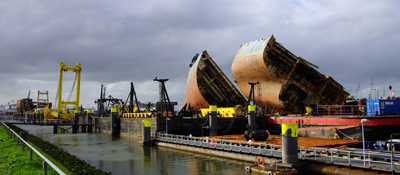Ship recycling
Worldwide hundreds of outdated ships are scrapped every year. The recycling occurs mostly in recycling facilities or yards. A lot of times, these ships are beached (driven onto a flat sandy beach at high speed) for subsequent manual dismantling often without any regards to environmental or occupational health and safety standards.
Ship Recycling Convention will set global standards
The International Convention for the Safe and Environmentally Sound Recycling of Ships, or Hong Kong Convention, is meant to address these problems. This Ship Recycling Convention was adopted by the International Maritime Organization (IMO) in 2009 but so far has not entered into force because the agreement has not been joined by enough member states. The convention contains regulations for shipowners, ship builders, manufacturers, suppliers and for recycling yards.
The Hong Kong Convention will apply to all new and existing sea-going vessels with a gross tonnage of 500 or more.
The new convention introduces two key components to be considered in future:
- Ship-specific Inventory of hazardous materials which lists all hazardous materials such as asbestos, PCB, ozone depleting substances and antifouling paints containing TBT as well as their location and approximate amount.
- Authorization of recycling facilities. Sea-going vessels may only be recycled by authorized yards complying fully with all environmental and safety requirements of the Hong Kong Convention.
The convention will enter into force two years after ratification by at least 15 states representing more than 40 per cent of the gross tonnage of the world’s merchant shipping. The convention was adopted in May 2009 but has not yet entered into force. This is where you can find the current status of this and other IMO conventions (under the heading “Summary Status for each Convention”).

EU Regulation already implements some of the requirements
For all ships
- On international voyages and
- Flying an EU flag and
- With a size of 500 GT or more,
Regulation EU 1257/2013 on ship recycling on the recycling of ships applies and it contains among other things the following requirements:
- These ships may only be recycled on authorized recycle yards on the EU list of recycle yards.
- These ships must carry a ship-specific Inventory of Hazardous Materials/IHM stating as a minimum the hazardous materials on board (structure and equipment) listed in Annex II as well as their location and the approximate amount.
- These ships must hold a Certificate on Inventory of Hazardous Materials.
- Existing ships only require the Inventory of Hazardous Materials and the associated certificate from 31 December 2020.
- The Inventories of Hazardous Materials and the associated certificates are approved by the respective Flag State.
- The ships intended to be passed to be recycled must have a Ready for Recycling Certificate.
Further information can be found in ISM Circular 03/2019.
Ships flying a flag of a non-EU State that call on a European port are required to carry an Inventory of Hazardous Materials as well as a Document of Compliance.
Source: deutsche-flagge